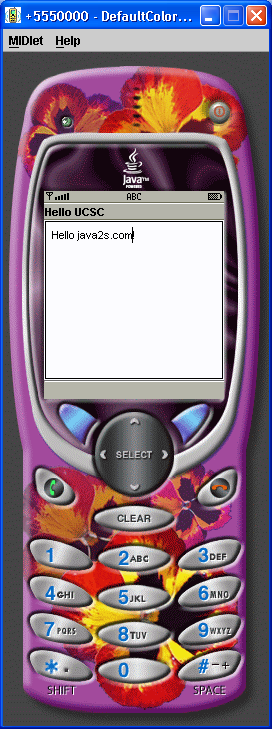Hello TextBox MIDlet

/*
*
* Copyright (c) 2000 Sun Microsystems, Inc. All Rights Reserved.
*
* Author: Srikanth Raju
*
* This software is the confidential and proprietary information of Sun
* Microsystems, Inc. ("Confidential Information"). You shall not
* disclose such Confidential Information and shall use it only in
* accordance with the terms of the license agreement you entered into
* with Sun.
*
* SUN MAKES NO REPRESENTATIONS OR WARRANTIES ABOUT THE SUITABILITY OF THE
* SOFTWARE, EITHER EXPRESS OR IMPLIED, INCLUDING BUT NOT LIMITED TO THE
* IMPLIED WARRANTIES OF MERCHANTABILITY, FITNESS FOR A PARTICULAR
* PURPOSE, OR NON-INFRINGEMENT. SUN SHALL NOT BE LIABLE FOR ANY DAMAGES
* SUFFERED BY LICENSEE AS A RESULT OF USING, MODIFYING OR DISTRIBUTING
* THIS SOFTWARE OR ITS DERIVATIVES.
*/
import javax.microedition.midlet.*;
import javax.microedition.lcdui.*;
/**
* An example MIDlet with simple "Hello" text in a TextBox
* Refer to the startApp, pauseApp, and destroyApp
* methods so see how each handles the requested transition.
*/
public class HelloTextBoxMIDlet extends MIDlet
{
private Display display; // The display for this MIDlet
public HelloTextBoxMIDlet() {
display = Display.getDisplay(this);
}
/**
* Start up the Hello MIDlet by creating the TextBox
*/
public void startApp() {
TextBox t = new TextBox("Hello UCSC", "Hello Saturday!", 256, 0);
display.setCurrent(t);
}
/**
* Pause is a no-op since there are no background activities or
* record stores that need to be closed.
*/
public void pauseApp() {
}
/**
* Destroy must cleanup everything not handled by the garbage collector.
* In this case there is nothing to cleanup.
*/
public void destroyApp(boolean unconditional) {
}
}
Related examples in the same category